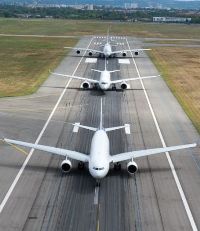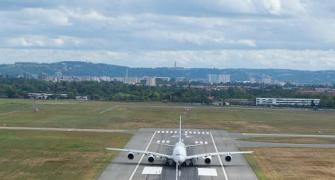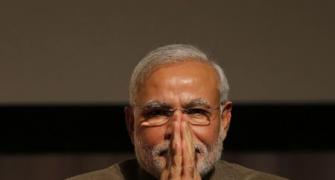 High taxes on fuel and rising operating costs were acting as a constraint to the growth of the aviation industry in India, global airlines' body IATA said on Wednesday.
High taxes on fuel and rising operating costs were acting as a constraint to the growth of the aviation industry in India, global airlines' body IATA said on Wednesday.
"High fuel taxes and operating costs, coupled with infrastructure constraints, remains a challenge" for the Indian aviation industry, International Air Transport Association Director General and CEO Tony Tyler said in Geneva.
He was replying to a question on the problems facing the Indian aviation sector.
Tyler, however, projected a healthy outlook for the global airline industry and said IATA expected 25 per cent growth in combined net profit to $25 billion in 2015 as against $19.9 in the current year on the back of falling crude prices.
"For 2015, we see airlines making a collective $25 billion net profit. That's up from USD 19 billion this year, $10.6 billion in 2013 and $6.1 billion in 2012," the chief of the International Air Transport Association said at the IATA Global Media Day in Geneva.
However, half of the $25 billion profit was expected to come from the North American carriers while the European airlines, were likely to contribute only $4 billion in the collective profits.
"I would like to impress upon you that while $25 billion may sound like a lot of money, it is distributed over a very fragmented industry with hundreds of players.
"Some airlines are making sustainable returns and others re struggling.
"Over half of the profits, some $13.2 billion, are expected to be generated by the airlines in North America.
In contrast, the European industry is of similar size but will make only $4," Tyler said.
Tyler said it must be recocgnised that a $25 billion profit on revenue of $783 billion amounted to a net profit margin of just 3.2 per cent, adding that this was ‘just a little better than the 3.1 per cent margin generated in 2010.’
"On a per passenger basis, the airlines will make about $7.08," he said.
Stating that IATA has noted an average crude oil price in excess of $100 per barrel since 2011 till this year, he said the projection for next year would see oil averaging at $85 per barrel.
"That is more than double the 2004 price, yet somehow it now seems cheap! There is no doubt that the recent fall in oil price is a relief for airlines," Tyler said.
Given all the risks in the world today, including the political instability, economic uncertainty, public health emergence and terrorism, there is not much buffer to absorb a significant change for the worse in the operating environment, he said.
Terming the case of gunning down of the Malaysian passenger plane MH-370 as 'outrageous’, Tyler said civilian aircraft should never be made a ‘military target’.
"In the mean time, passengers can be reassured that MH-370 was an extremely rare, if not a unique event.
“Even though aircraft cannot be tracked in all cases, flying is safe. Over 100,000 flights operate safely every day.
“And new technology will play an important role in making the system even more robust," the IATA chief said.
Tyler said IATA estimates showed the number of flyers to stand at 3.5 billion in 2015 while airlines were expected to transport 53.5 million tonnes of cargo worth $7.3 trillion next year.









